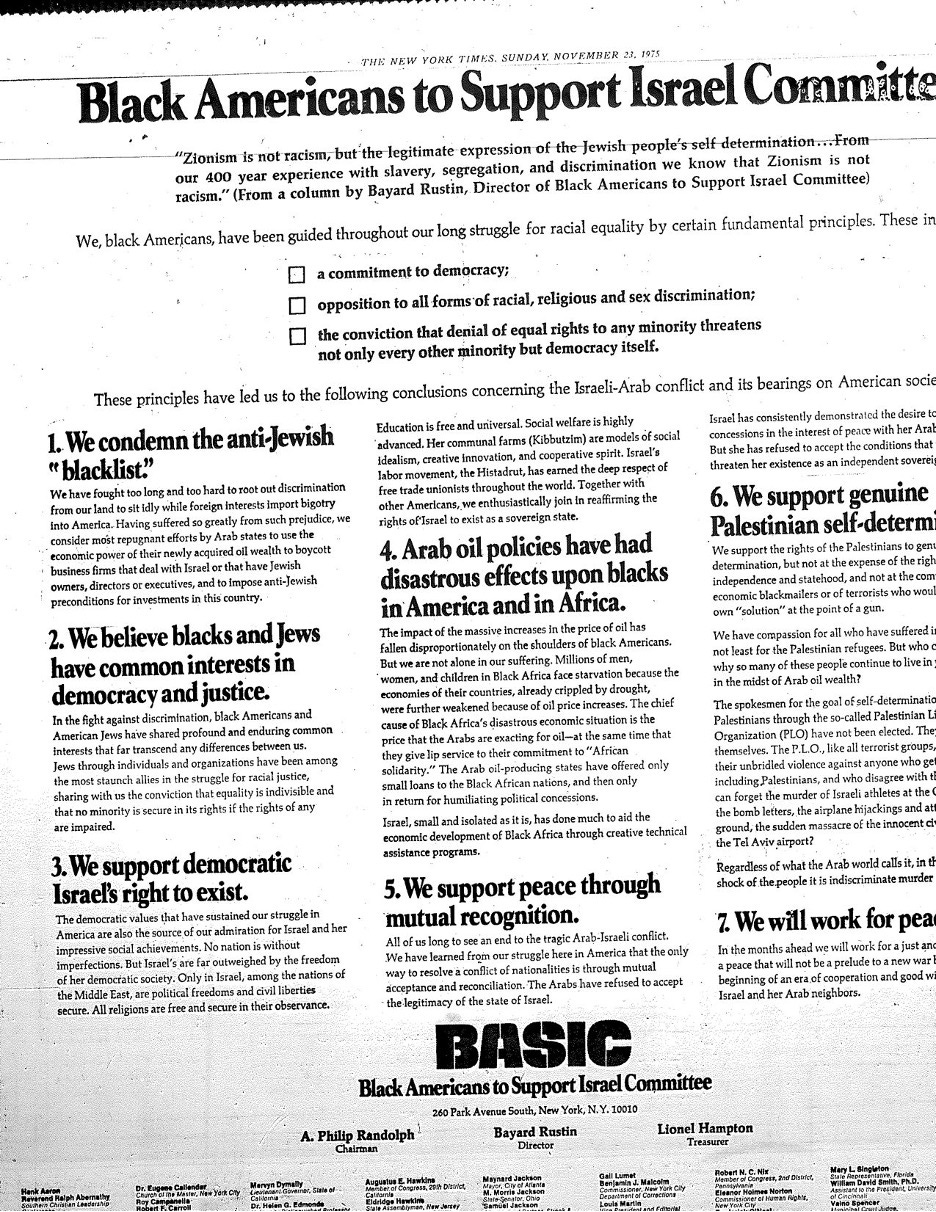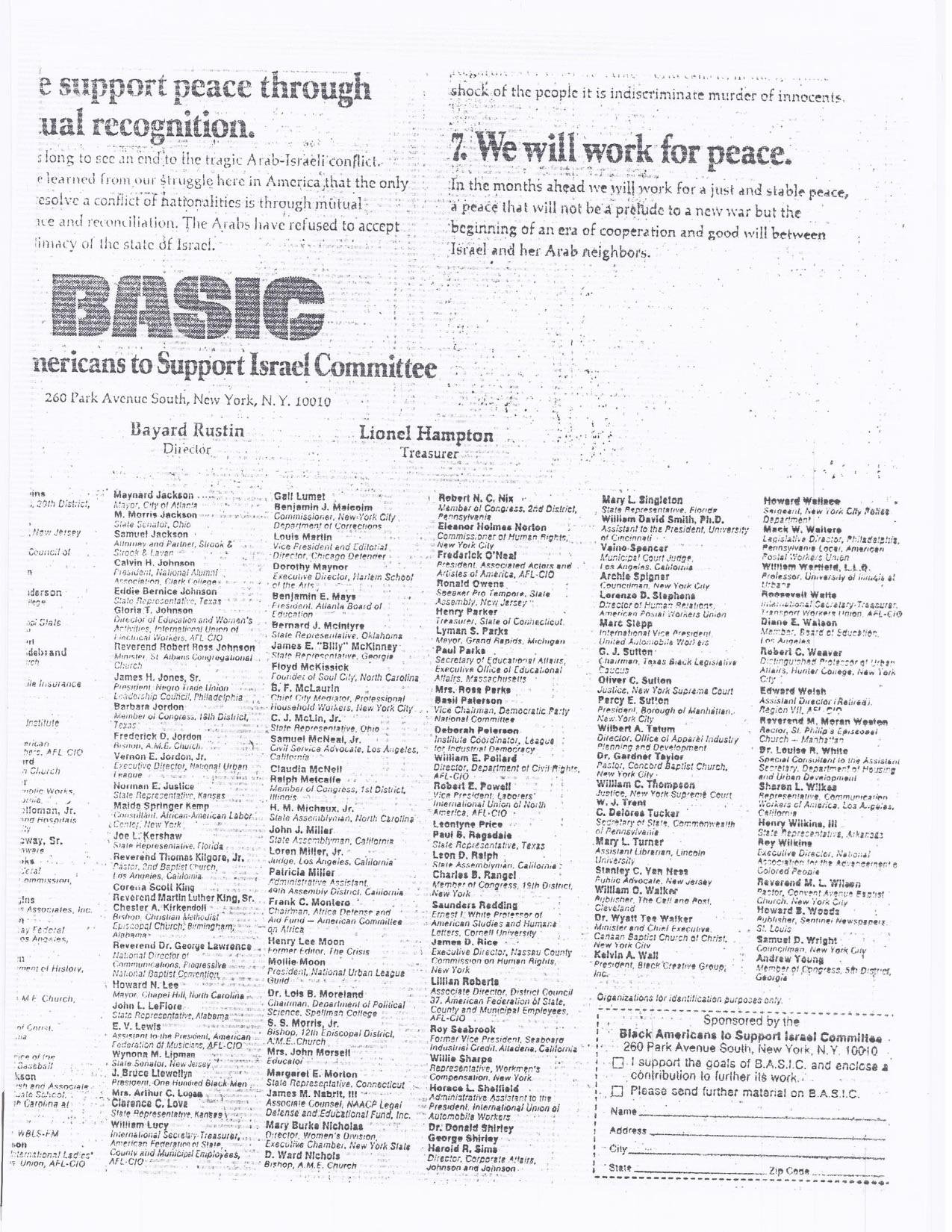BASIC - Black Americans to Support Israel Committee, 1975
The Black Community's Response to the Demonization of Israel

The following are edited excerpts of Zionism & the Black Church, © 2021 Umndeni Press by Dumisani Washington
In researching this book, I came across an article written by history professor and author Gil Troy. In the piece, Professor Troy mentioned Bayard Rustin and an organization called BASIC (Black Americans to Support Israel Committee). Bayard Rustin was a civil rights warrior and a close friend and colleague of Dr. King. Mr. Rustin was also Dr. King’s coach in non-violent protests inspired by Gandhi. Continuing Dr. King’s pro-Israel, pro-peace legacy after his death, his associates, Bayard Rustin and A. Philip Randolph, formed BASIC to galvanize Black American solidarity with Israel and the Jewish people.
Until reading Gil Troy’s article, I had never heard of BASIC. The discovery was a very emotional experience for me. I was personally relieved to learn that amid the exploitation of the Black struggle for justice and the international condemnation of Israel, many Black Americans defended their heritage and stood by their Jewish brothers. They refused to forget the shared legacy of oppression and the need to band together when attacked. Though I was heartened to learn of post-Dr. King efforts like BASIC, I was also disappointed that this information was not common knowledge, especially with the global rise of antisemitism disguised as justice. That is much of the reason I was inspired to write this book.
After Palestine Liberation Organization (PLO) Chairman, Yasser Arafat’s 1974 attack on Israel at the United Nations, Bayard Rustin and BASIC led the Black American response. Rustin wrote prolifically on the Arab-Israeli conflict as well as the Arab attempts to co-opt the legacy of the Black struggle for freedom. Regarding Arafat’s speech and the PLO, Rustin wrote a reply in January 1975:
What, then of the PLO’s charge that Israel is a “racist” nation. This accusation has been repeated so often - Arafat made numerous references to Israeli “racism” and “colonialism” in his U.N. Address - that it has achieved a measure of acceptance worldwide, and in the American black community.
The question is what do the Arabs mean by “racism?” The standard definition is the systematic oppression of an ethnic or racial minority, very often justified on the grounds that the minority is inherently less intelligent, less clean, less pure or in some way inferior to the majority.
Applying this measurement, it is apparent that some of the most blatant “racist” regimes are in Arab lands. In Iraq, Jews were hanged in a public square, while today napalm is employed against the dissident Kurdish minority. Syria rivals Nazi Germany in its brutal treatment of its Jewish citizens, who are confined to a cramped quarter of Damascus, prevented from emigrating, and from time to time murdered with official sanction. And in the Sudan, it was non-Moslem blacks who were the target of a genocidal war in which 500,000 were killed and many thousands more forced to flee their homes.1
Bayard Rustin also spoke to the dangers of the international community ignoring the terrorism and violence Yasser Arafat was inflicting on the Israelis. Like Dr. King’s almost prophetic call to stand with Israel in 1968, Rustin correctly predicted what would happen if the world turned a blind eye to the slaughtering of Israeli civilians. “By embracing the PLO, the United Nations has given a solemn amen to organized brutality, encouraging along the way no one knows how many other extremist organizations with a grudge against society.”2
Rustin foresaw what we know today as global terrorism—Palestinian-style violence against Israel exported internationally. This is being done by an untold number of “extremist organizations with a grudge against society.” What the Palestinians exacted against Israeli men, women, and children in the name of justice—car-ramming, shooting, stabbing, suicide bombing, plane hijacking—is no longer merely an Israeli problem. As the world allowed terrorism to happen to Israel, terrorism is now happening to the world.
On Sunday, November 23, 1975, BASIC took out a full-page ad3 in the New York Times, detailing a seven-part declaration of solidarity with Israel. It was endorsed by 200 prominent Black Americans from virtually every facet of society, including Coretta Scott-King, Martin Luther King, Sr., Mrs. Medgar Evers, Andrew Young, David Dinkins, Rosa Parks, Arthur Ashe, and opera star Leontyne Price.
We, black Americans, have been guided throughout our long struggle for racial equality by certain fundamental principles.
These include:
A. a commitment to democracy;
B. opposition to all forms of racial, religious and sex discrimination;
C. the conviction that denial of equal rights to any minority threatens not only every other minority but democracy itself.
These principles have led us to the following conclusions concerning the Israeli-Arab conflict and its bearings on American society:
1. We condemn the anti-Jewish “blacklist.”
We have fought too long and too hard to root out discrimination from our land to sit idly while foreign interests import bigotry into America. Having suffered so greatly from such prejudice, we consider most repugnant efforts by Arab states to use the economic power of their newly acquired oil wealth to boycott business firms that deal with Israel or that have Jewish owners, directors or executives and to impose anti-Jewish preconditions for investments in this country.
2. We believe blacks and Jews have common interests in democracy and justice.
In the fight against discrimination, black Americans and American Jews have shared profound and enduring common interests that far transcend any differences between us. Jews through individuals and organizations have been among the most staunch allies in the struggle for racial justice, sharing with us the conviction that equality is indivisible and that no minority is secure in its rights if the rights of any are impaired.
3. We support democratic Israel’s right to exist.
The democratic values that have sustained our struggle in America are also the source of our admiration for Israel and her impressive social achievements. No nation is without imperfections. But Israel’s are far outweighed by the freedom of her democratic society. Only in Israel, among the nations of the Middle East, are political freedoms and civil liberties secure. All religions are free and secure in their observance. Education is free and universal. Social welfare is highly advanced. Her communal farms (Kibbutzim) are models of social idealism, creative innovation, cooperative spirit. Israel’s labor movement, the Histadrut, has earned the deep respect of freed trade unionists throughout the world.
4. Arab oil prices have had disastrous effects upon blacks in America and in Africa.
The impact of the massive increases in the price of oil has fallen disproportionately on the shoulders of black Americans. But we are not alone in our suffering. Millions of men, women, and children in Black Africa face starvation because the economies of their countries, already crippled by drought, were further weakened because of oil price increases. The chief cause of Black Africa’s disastrous economic situation is the price that the Arabs are exacting for oil - at the same time that they give lip service to their commitment to “African solidarity.” The Arab oil-producing states have offered only small loans to the Black African nations, and then only in return for humiliating political concessions.
Israel, small and isolated as it is, has done much to aid the economic development of Black Africa through creative technical programs.
5. We support peace through mutual recognition.
All of us long to see an end to the tragic Arab-Israeli conflict. We have learned from our struggle here in America that the only way to resolve a conflict of nationalities is through mutual acceptance and reconciliation. The Arabs have refused to accept the legitimacy of the state of Israel. Israel consistently demonstrated the desire to make concessions in the interest of peace with her Arab neighbors. But she has refused to accept the conditions that would threaten her existence as an independent sovereign nation.
6. We support genuine Palestinian self-determination.
We support the rights of the Palestinians to genuine self-determination, but not at the expense of the rights of Jews to independence and statehood, and not at the command of economic blackmailers or of terrorists who would force their own “solution” at the point of a gun.
We have compassion for all who have suffered in this conflict, not least for the Palestinian refugees. But who can avoid asking why so many of these people continue to live in poverty in the midst of Arab wealth?
The spokesmen for the goal of self-determination for the Palestinians through the so-called Palestinian Liberation Organization (PLO) have not been elected. They represent only themselves. The P.L.O., like all terrorist groups, have turned their unbridled violence against anyone who gets in their way, including Palestinians, and who disagree with them. Who can forget the murder of Israeli athletes at the Olympic games, the bomb letters, the airplane hijackings and attacks on the ground, the sudden massacre of the innocent civilians at the airport in Tel Aviv?
Regardless of what the Arab world calls it, in the horrified shock of the people it is indiscriminate murder of innocents.
7. We will work for peace.
In the months ahead we will work for a just and stable peace, a peace that will not be a prelude to a new war but the beginning of an era of cooperation and good will between Israel and her Arab neighbors.
From, “The PLO: Freedom fighters or terrorists,” by B. Rustin, 1975, The Chicago Defender. Retrieved from Institute for Black Solidarity with Israel (IBSI).
From, “The PLO: Freedom fighters or terrorists,” by B. Rustin, 1975, The Chicago Defender. Retrieved from Institute for Black Solidarity with Israel (IBSI).
https://www.ibsi-now.org/documents






Brilliant. Thank you so much. This feels prophetic.
Thank you so much for preserving the letter. It was getting harder and harder to find.